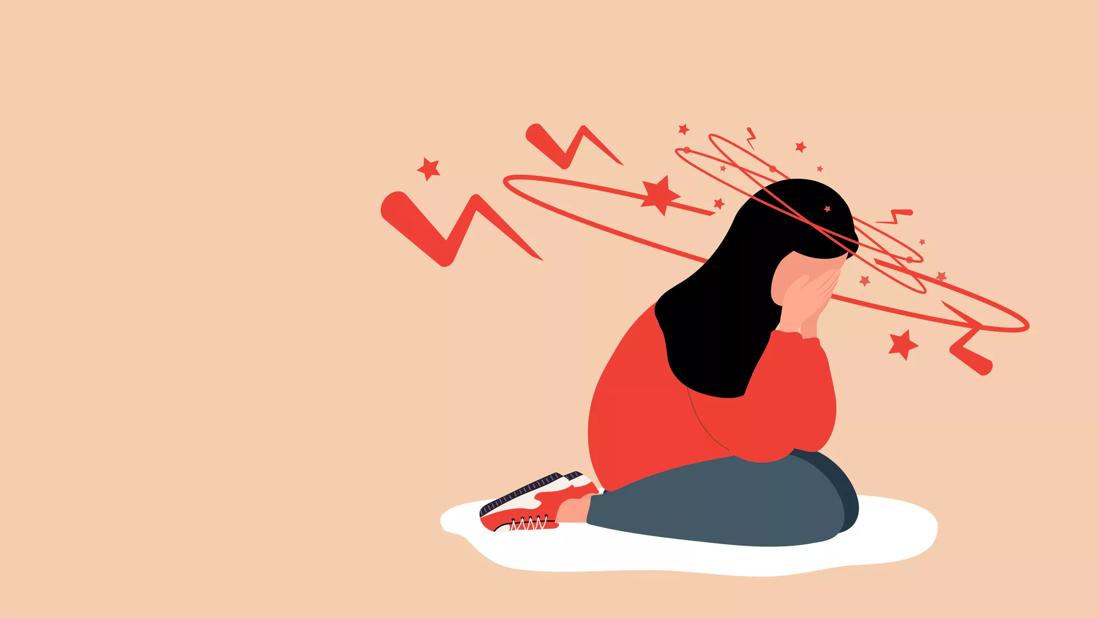Advertisement
Severe and debilitating headaches can affect the quality of your child’s life

Nearly 60% of children around the world share a common pain — headaches.
Advertisement
Cleveland Clinic is a non-profit academic medical center. Advertising on our site helps support our mission. We do not endorse non-Cleveland Clinic products or services. Policy
We’re not just talking about slight discomfort either. These are significant headaches, the type of intense throbbing that makes it difficult for kids to go to school, concentrate or find much joy in daily life.
So, how do you know if a child’s headache is more than a common bit of head pain? And what can you do about it?
We asked pediatric psychologist Ethan Benore, PhD, a pain intervention specialist, for answers.
The easiest way to find out if your child is experiencing a headache is for them to tell you about the pain in their head. But as anyone who spends time around kids knows, a useful flow of information isn’t always guaranteed.
Younger children may have trouble communicating how they’re feeling. Teens may just … well, respond like teenagers and not feel comfortable sharing.
So, if you’re not getting verbal cues, signs of severe headache disorders in children may include:
Some children “may just look out of it for no apparent reason,” says Dr. Benore. Children presenting with these symptoms without a known cause should be examined to see if the issue is headache-related.
School-related issues also may be a red flag. Researchers say that children with headaches are more likely to be absent from class or run into school-related problems when they are in attendance.
Did you know that there are more than 150 different types of headaches? Given that variety, it stands to reason there’s not one simple explanation as to why your child might get intense and even debilitating pain in their head.
“Multiple factors can trigger headaches or make them more likely,” says Dr. Benore. “It seems to be kind of individualized in terms of what sets headaches off.”
But if there is a common cause, it’s stress. “Upwards of 40% to 50% of headaches could be stress-related,” he continues. “So, if a child is in a stressful environment, that could be a major cause.”
An occasional headache is common. But frequent and severe headaches deserve attention, given potential health concerns and the effect they can have on your child’s quality of life.
“If your child is dealing with a severe headache more than once a week, on average, you should get additional consultation,” recommends Dr. Benore.
Advertisement
If your child consistently deals with headaches, Dr. Benore suggests taking a three-prong approach to try to ease the pain for your kiddo.
Your child’s day-to-day routine may be fueling their chronic headaches. Taking a S.M.A.R.T. approach and making changes is sometimes all that’s needed to stop headaches from happening.
So, what does that mean? Let’s break it down.
“The S.M.A.R.T. approach should really be your first line of defense against headaches,” Dr. Benore adds. “Attacking headaches from these areas often proves to be very, very beneficial.”
If your child experiences multiple headaches per month, they may be a candidate for preventive headache medications. Start a discussion with your healthcare provider about options.
Advertisement
“There’s conflicting research about the benefits of this approach,” says Dr. Benore. “Some children respond to these medications. Some don’t.”
Virtually every household medicine cabinet includes a bottle pain reliever or nonsteroidal anti-inflammatory drugs, or NSAIDs. This would include well-known products such as Tylenol® or nonsteroidal anti-inflammatory drugs (NSAIDs) like Advil® or Aleve®.
Work with your primary care doctor to find the right dosage and frequency for use, says Dr. Benore.
“Most children respond well if given the appropriate dosage as soon as possible,” he notes. “Don’t wait to see if a headache turns into a bad headache. If you wait too long, sometimes these medications don’t help.”
Be cautious about relying too heavily on these pain relievers, though. “You can actually create medication overuse headaches,” warns Dr. Benore. “A good rule of thumb is not to take them more than three times a week or 10 times a month.”
Recurring or severe headaches may be a sign that your child is feeling overwhelmed or experiencing a health issue. Don’t ignore patterns of pain by just treating the symptoms with over-the-counter medications.
“Take the time to take a closer look at how the child is doing overall,” advises Dr. Benore. “Are they stressed or being bullied? Are they not getting enough sleep or skipping meals? Maybe they need glasses? You might find a reason behind the headaches within day-to-day life.”
Advertisement
Learn more about our editorial process.
Advertisement

Integrating coping skills into your teen’s daily routine helps turn self-care into a lifelong healthy habit

Talking in the car, resisting the urge to judge and asking specific questions can help rebuild rapport

Yes, it’s safe for babies starting at about 9 months old and can help clear nasal mucus

Local LGBT centers, online directories, visual cues and gender-affirming care or non-discrimination policies can all be helpful resources and cues

From newborn through teen years, your child’s sleep needs will change

Early weight gain can lead to health issues like heart disease, diabetes and cancer

Current research suggests 1 out of every 36 children in the U.S. has ASD — and that’s probably an undercount

For starters, autism spectrum disorder isn’t a disease

Focus on your body’s metabolic set point by eating healthy foods, making exercise a part of your routine and reducing stress

PFAS chemicals may make life easier — but they aren’t always so easy on the human body

While there’s little risk in trying this hair care treatment, there isn’t much science to back up the claims